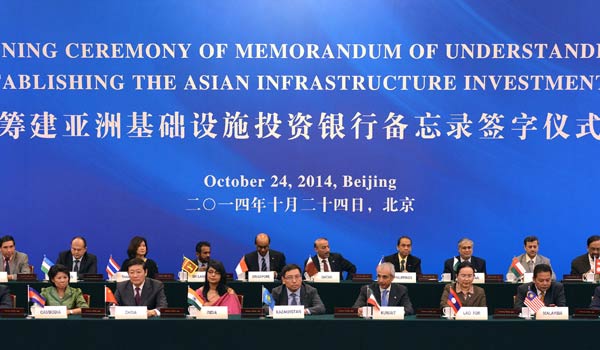 |
|
The signing ceremony of memorandum of understanding on establishing the Asian Infrastructure Investment Bank (AIIB) is held in Beijing, Oct 24 2014. [Photo/Xinhua] |
Since last month, the China-initiated Asian Infrastructure Investment Bank has been constantly in the global spotlight. The popularity of the bank culminated on April 15 when a total of 57 countries were approved as founding members.
The number of founding members exceeded expectations. The AIIB's attractiveness has aroused uneasiness and even acrimony among those who still harbor a Cold War mentality. Under such circumstances, China, as the initiator of the bank, should remain sober-minded when it sets out to design the architecture of the bank with member countries.
In the months to come, the AIIB will focus on establishing its charter, governance structure, innovative management design and funding mechanism. It has vowed to learn from the World Bank, the International Monetary Fund, the Asian Development Bank and other international financial institutions.
Over the years, these international lenders have accumulated many good experiences and practices with regards to governance structure, environmental evaluation, procurement, debt sustainability and project management. Their experience will help the fledgling multilateral lender to lay down its own mark.
On the other hand, the AIIB should cast aside the widely denounced practices of current international lenders and blaze a new trail by ushering in the best practices that feature efficient and effective governance. China should serve as a bridge to coordinate the interests of the different parties so that the rights and interests of all 57 founding members can be respected and guaranteed.
China has rich experience in infrastructure development both at home and abroad. It has huge foreign reserves, which could be used to fill in the funding gap needed to break the infrastructure bottleneck in Asia. Last week, China set a good example in this aspect by allocating $46 billion to infrastructure construction projects in Pakistan during President Xi Jinping's state visit to Islamabad.
As a big country shouldering great responsibility for regional peace and development, China is willing to play a more active role in bettering the region's infrastructure and laying a solid foundation for the region's common development and prosperity. And it is willing to do so through multilateral cooperation with international partners.
Considering that the world economy is still dragging its feet and there is a huge demand for infrastructure investment in Asia, the establishment and effective operation of the AIIB will not only contribute to better connectivity and greater self-development capability in the region but also help drive the wheel of world economic development.
One of the ultimate aims of the AIIB is to better reallocate resources, and this will no doubt improve the efficiency of capital utilization. On top of that, the AIIB also shoulders responsibilities in pushing for reforms in the international monetary system and improving the international governance of the world financial system.
It will uphold high standards and abide by strict regulations to avoid repeating past mistakes, reduce operation costs and increase efficiency. It will have zero-tolerance toward corruption and be dedicated to promoting green and low-carbon economies.
As the AIIB strives to be open and inclusive, it will also rise to the challenge of coordinating the member countries in meeting their respective needs. The AIIB should be cultivated into effective platform where the interests of different parties converge to achieve all-win outcomes.
Of course, given the changes taking place in the world and regional arenas, the AIIB will face many challenges in playing its full role in the region. Its loans will go to fund infrastructure projects in Asian countries which may face political unrest or security concerns. The investments will mostly be long-term ones with slow economic returns.
All this requires the AIIB keep an open mind and continuously strive to improve its practices. The outside world should also have patience and tolerance of its novel design.
The author is a senior writer with China Daily.